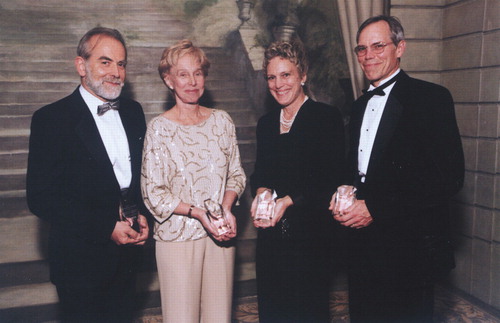NARSAD Gala Honors Groundbreaking Researchers
 On October 11, something noteworthy took place in the field of psychiatric research. The National Alliance for Research on Schizophrenia and Depression (NARSAD) held its annual awards dinner in New York City.
On October 11, something noteworthy took place in the field of psychiatric research. The National Alliance for Research on Schizophrenia and Depression (NARSAD) held its annual awards dinner in New York City.
The dinner raised more than $1.3 million for research in schizophrenia, affective disorders, and other psychiatric illnesses. Undoubtedly a substantial part of this money will be used for novel research or for studies undertaken by young investigators, as has been the case in the past (see Original article: page 46). But the dinner also honored four well-established psychiatric scientists for their outstanding research contributions.
The scientists were Francine Benes, M.D., Ph.D., a professor of psychiatry at Harvard University Medical School; Paul Grof, M.D., Ph.D., a professor of psychiatry at the University of Ottawa; Ronald Duman, Ph.D., a professor of psychiatry and pharmacology at Yale University Medical School; and Judith Rapoport, M.D., chief of the Child Psychiatry Branch at the National Institute of Mental Health.
Benes received NARSAD’s 2002 Lieber Prize for Schizophrenia Research for her studies of neuronal miswiring in the brains of schizophrenia patients. The Lieber award selection committee noted that her research “helped to spawn a new era of neuropathology focused on specific circuits and neuroscience-based hypotheses of structural deficits in the brains of patients with schizophrenia.”
Benes has also undertaken studies of the onset of schizophrenia. In 1996, for instance, she and her colleagues demonstrated that during late adolescence and early adulthood neurons using dopamine appear to increase their interactions with neurons that use GABA in the limbic area of the brain. She postulated that this change might trigger the start of schizophrenia in persons susceptible to the illness.
Both Grof and Duman received NARSAD’s 2002 Nola Maddox Falcone Prize for Affective Disorders Research. Grof received the award for his contributions to the understanding and treatment of bipolar disorder. He has conducted pioneering studies revealing the unpredictable recurrent course of bipolar illness and the unique and complete response to lithium carbonate in a subgroup of patients. Duman got the award for helping define the neurobiological mechanisms involved in the effects of stress and antidepressant medications. For example, he and his colleagues showed that chronic antidepressant treatment blocks or reverses cell loss causes by stress—loss that is believed to contribute to depression.
Rapoport received NARSAD’s Ruane Prize for Outstanding Research in Child and Adolescent Psychiatry. According to the Ruane award selection committee, Rapoport’s research “emerged during an era when it was almost inconceivable to think of children as having a psychiatric disorder. She pioneered the use of medication to help children with attention-deficit disorder, obsessive-compulsive disorder, and, most recently, with schizophrenia.” For instance, she was the first to investigate atypical antipsychotic medication in children with schizophrenia.
NARSAD also presented two public service awards at the dinner. One went to Sylvia Nasar, author of the bestselling book A Beautiful Mind, which is the story of a brilliant mathematician who developed schizophrenia. The other award was bestowed on the team that made the Oscar-winning film based on the book. ▪



